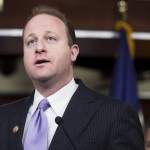Colorado Obamacare enrollment rising despite federal uncertainty
Health insurance enrollment on the state’s Obamacare marketplace jumped by nearly 30 percent this year compared to last, according to Connect For Health Colorado officials, meaning Coloradans at least seem to be shaking off federal uncertainty in favor of being insured.
“With only two weeks left to enroll for January coverage, I am pleased with the pace of plan selections,” Connect For Health Colorado CEO Kevin Patterson said in a press release.
“I know people are busy this time of year, but I encourage everyone who buys their own health insurance to check to see if they qualify for financial assistance, review the available plans, and complete an enrollment before the last-minute rush,” Patterson added. “Many will be surprised that they qualify for financial help.”
Open enrollment kicked off Nov. 1, and so far Coloradans have signed up for 43,881 medical plans this year compared to 34,085 in November of 2016. Eighteen percent are new enrollees for 2018 insurance plans, and 82 percent are renewing Connect for Health customers.
The enrollment deadline to have a plan in place by Jan. 1 of 2018 is Dec. 15. Open enrollment will continue through Jan. 12, but anyone signing up after Dec. 15 won’t be covered until Feb. 1. Go to Connect for Health Colorado to shop for plans, or call a local insurance broker.
About 8 percent of Coloradans don’t get health insurance through their employers and therefore must purchase plans on the individual or small-group markets. In Eagle County, that means either Kaiser or Anthem, and rates have been spiraling upward in recent years.

U.S. Rep. Jared Polis, D-Boulder
There are several reasons for individual rates in mountain resort counties rising so dramatically the last few years, including a lack of competition and healthcare providers, but federal uncertainty over the fate of Obamacare certainly hasn’t helped, experts say.
Congress tried and failed repeatedly over the summer to repeal and replace Obamacare, or the Affordable Care Act (ACA) of 2010. Since then the Trump administration has taken several steps policy analysts say have further destabilized the individual and small-group markets.
Now the Senate tax bill passed in the early morning Saturday includes a repeal of Obamacare’s unpopular individual mandate that requires everyone to have health insurance or pay a penalty. Colorado Gov. John Hickenlooper recently blasted that aspect of the Senate tax bill.
“Losing the individual mandate would mean 13 million people lose health care coverage, increasing costs by up to 10 percent for everyone else and driving the burden on to middle class families,” Hickenlooper, a Democrat, said in a recent prepared statement on the tax bill.
Maine Republican Susan Collins voted for the bill after leadership promised support for two bipartisan bills aimed at stabilizing Obamacare. The Senate tax bill must now be reconciled with the House version of the bill, which does not include a repeal of the individual mandate.
“Today marks a historic day for our country,” Colorado Republican Sen. Cory Gardner tweeted early Saturday. “It has been over 30 years since Congress has passed major tax reform and I’m excited to bring tax relief to millions of Coloradans.”
In a press release, Gardner did not comment on the healthcare implications of the bill. His Democratic counterpart, Colorado Sen. Michael Bennet, tweeted his extreme displeasure with the late-night passage of the bill and previously blasted healthcare’s inclusion in the GOP plan.
“This year, @SenateGOP tried 4 separate times to repeal the ACA and replace it with a proposal to cut taxes for those w/ yearly incomes over $1 million & slash health care for most vulnerable.,” Bennet tweeted in mid-November. “We stopped them then, and we must stop them again …”
The House last month narrowly passed its own tax bill, without taking on Obamacare, and Republican U.S. Rep. Scott Tipton voted in favor of it – just as he voted in favor of a House healthcare bill in May that successfully passed but was never taken up in the Senate.
“In short, the Tax Cuts and Jobs Act will be good for Colorado,” said Tipton, who represents part of Eagle County in Congress. “A recent study by the nonpartisan Tax Foundation estimates that, under the new tax plan, Colorado will add 15,993 new jobs and median-income families will see a $2,682 increase in their income.”
But former Eagle County state Rep. Diane Mitsch Bush, a Democrat from Steamboat Springs who’s seeking her party’s nomination to challenge Tipton next year, decried the Senate’s repeal of the individual mandate and other aspects of Republican tax reform she says will eliminate healthcare cost deductions as well as trigger Medicaid cuts as the deficit increases.
“Health expenses are the major cause of bankruptcy for individual and households, and so it’s going to get worse,” Mitsch Bush predicts. “That part of the bill will really affect a large number of Coloradans. Bear in mind all of that doesn’t even count the billions in mandatory cuts to Medicaid.”
Rep. Jared Polis, a Democrat who represents part of Eagle County in the House, also attacked the Senate plan in late-night email to constituents and an earlier blog post.
“Republicans have even used this tax bill to attack our healthcare,” Polis wrote. “Non-partisan projections indicate that nearly 230,000 Coloradans would lose their health insurance under this tax scheme, and rates would go up at least 10 percent for the rest of us.”


Latest posts by David O. Williams (see all)
- Democratization or ruination? A deep dive on impacts of multi-resort ski passes on ski towns - February 5, 2025
- Western Rail Coalition looks to revive passenger rail service on long-dormant line connecting Colorado mountain towns - January 22, 2025
- Colorado ski town looks to dig deep, diversify energy sources as climate change threat looms - January 10, 2025

You must be logged in to post a comment Login